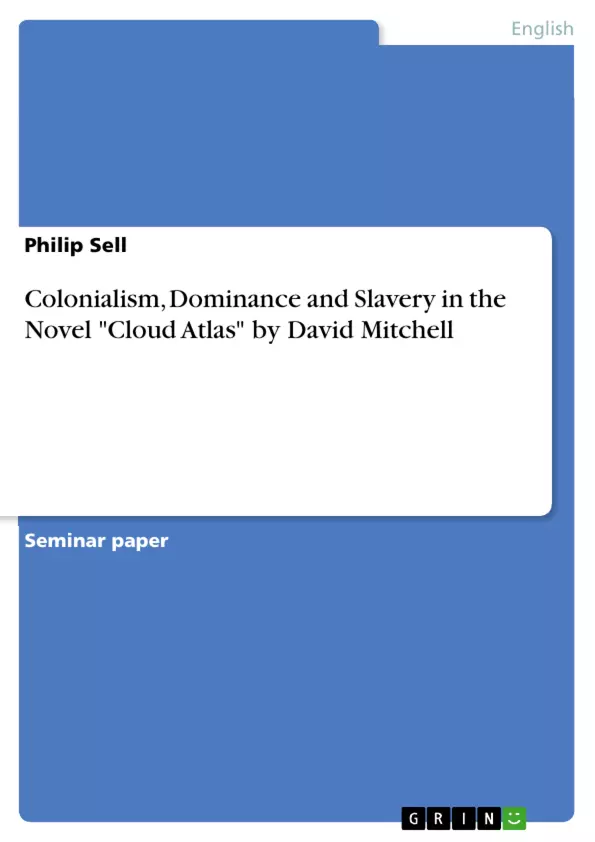The paper intends to show you the relevance of power and authority in David Mitchell's novel “Cloud Atlas”. To do so this paper investigates the different characters and their identities. Do they all suffer from a kind of oppression and what else do they have in common concerning the question of dominance of stronger people towards weaker?
These questions will be answered in the first chapter of the main body. Here the reader has to expect an overview of the different actions of the narrators rather than a general study of their characters. The several forms of oppression and the dangers the main characters had, have or will have to fear will be outlined. Furthermore, some other aspects and terms will be mentioned and explained there in general, especially the concept of temporality and its meaning inside the novel. After giving you this review I will concentrate on two main protagonists, Adam Ewing and Sonmi~451. Here again, but in a lot more detail, I will highlight the relevance of colonialism, dominance and slavery in the cases of these two characters. Questions that guide these chapters are the following: What have the narrators done or what have they not done to escape from their fate and what is the solution of their problems? In addition to the previous issues and goals I strive to achieve I want to complete this term paper with a conclusion. This conclusion first of all contains a summary of the general aspects dealt with in the main body. Moreover, a thesis will be established that might be controversial and proper to be discussed in subsequent contentions with the same or similar topics and will of course have reference to the overall topic colonialism, dominance and slavery in David Mitchell´s “Cloud Atlas”.
Inhaltsverzeichnis (Table of Contents)
- Introduction
- I. Experiences of the Narrators
- The Pacific Journal of Adam Ewing
- Letters from Zedelghem
- Half-Lives - The First Luisa Rey Mystery
- The Ghastly Ordeal of Timothy Cavendish
- The Orison of Sonmi~451
- Sloosha's Crossin' an' Ev'rythin' After
- II. The Pacific Journal of Adam Ewing
Zielsetzung und Themenschwerpunkte (Objectives and Key Themes)
This term paper aims to demonstrate the significance of dominance and oppression in David Mitchell's novel Cloud Atlas. It will investigate various forms of exploitation experienced by the different narrators, exploring how these themes contribute to the overarching narrative and its message.
- Reincarnation and the idea of an afterlife
- Dominance and oppression in various forms
- Colonialism, slavery, and power dynamics
- Temporality and its impact on narrative structure
- The cyclical nature of history and societal progression
Zusammenfassung der Kapitel (Chapter Summaries)
The first chapter provides an overview of the six narratives in Cloud Atlas, highlighting their shared experiences of exploitation and oppression. It explores the different historical contexts and forms of power dynamics present in each story, such as colonial, political, and economic exploitation.
Chapter II focuses on the experiences of Adam Ewing in his journal entries, illustrating the historical context of colonialism and the brutal consequences of Western imperialism on indigenous populations. It specifically examines the massacre and enslavement of the Moriori tribe on the Chatham Islands, shedding light on the themes of dominance and oppression that are central to the novel.
Schlüsselwörter (Keywords)
The main keywords and focus topics of this work include: colonialism, dominance, oppression, slavery, temporality, reincarnation, exploitation, power dynamics, and the concept of an afterlife. The analysis will also incorporate key themes such as the cyclical nature of history, societal progression, and the human condition.
Frequently Asked Questions
What is the significance of power and authority in David Mitchell's 'Cloud Atlas'?
The novel explores how stronger individuals and societies dominate weaker ones across different time periods, highlighting the persistent nature of oppression.
How is colonialism depicted in the story of Adam Ewing?
Through Ewing's journal, the novel illustrates the brutal impact of Western imperialism, specifically the enslavement and massacre of the Moriori tribe.
What themes do Adam Ewing and Sonmi~451 share?
Both characters face extreme forms of slavery and institutionalized dominance—Ewing in a 19th-century colonial context and Sonmi in a futuristic corporate dystopia.
What role does 'temporality' play in the novel's structure?
Temporality links the six narratives, suggesting a cyclical nature of history where the same patterns of human behavior and oppression repeat over centuries.
Does the novel suggest a solution to the problem of dominance?
The paper investigates the characters' attempts to escape their fates, exploring whether individual resistance can break the cycle of societal exploitation.
- Citation du texte
- Philip Sell (Auteur), 2016, Colonialism, Dominance and Slavery in the Novel "Cloud Atlas" by David Mitchell, Munich, GRIN Verlag, https://www.grin.com/document/994835



